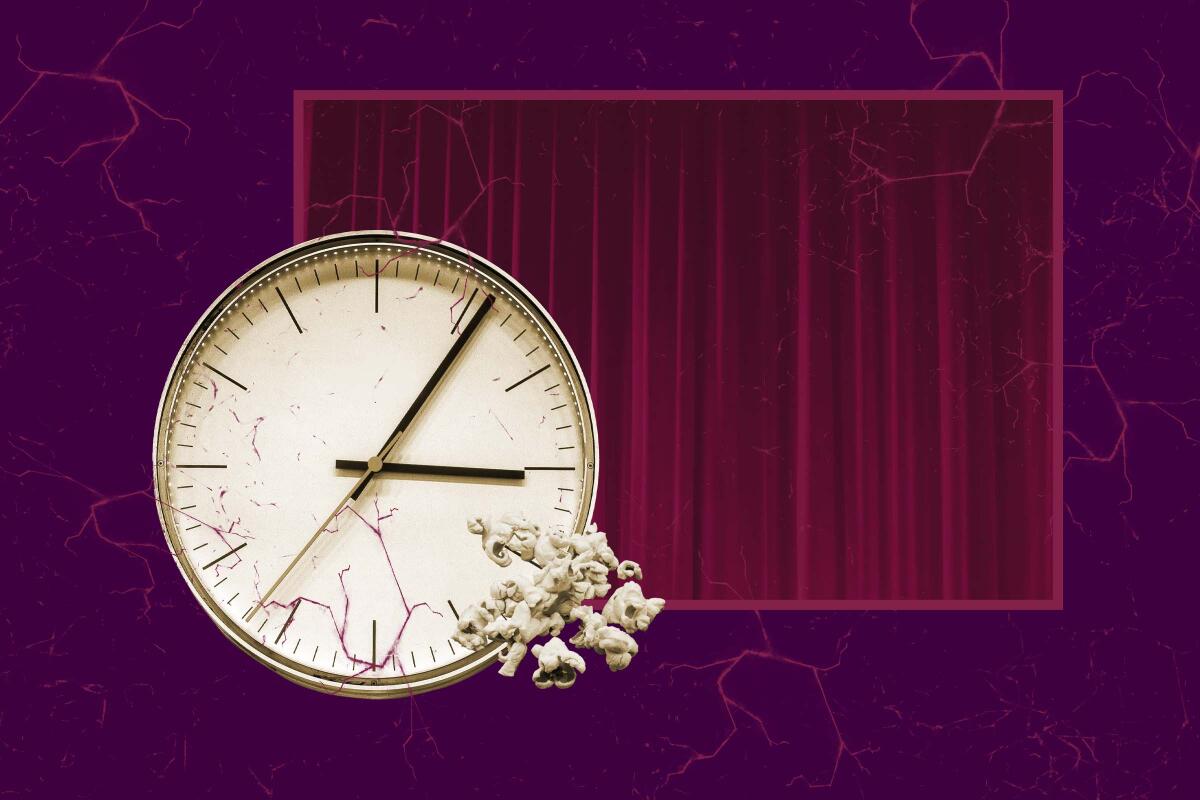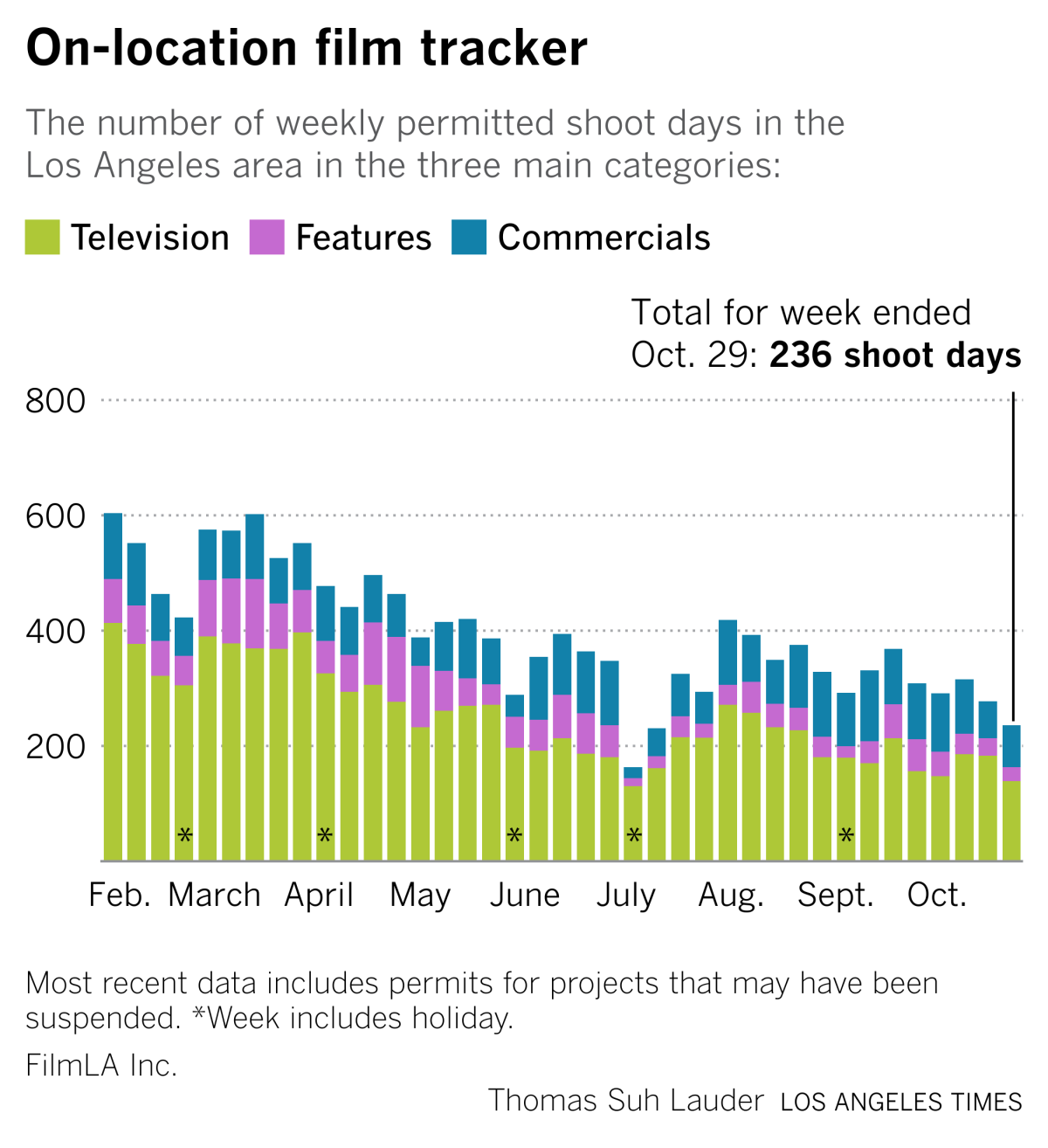New Hollywood epics revive old debate about long movies and intermissions

Welcome to the Wide Shot, a newsletter about the business of entertainment. Sign up here to get it in your inbox.
How long is too long?
Every so often, a certain cadre of frequent and professional moviegoers revives the debate about whether some movies are asking too much of our social media-addled attention spans. The latest cycle of this timeworn question is brought to you by Martin Scorsese’s epic “Killers of the Flower Moon,” clocking in at nearly three and a half hours.
I was joking around recently with a couple of theater executives about whether Hollywood ought to bring back the old-fashioned intermission to give patrons a few minutes to run to the bathroom, in a throwback to the days of “Gone With the Wind” and “Lawrence of Arabia.” Long ago, intermissions served a practical purpose for theaters, allowing projectionists time to change the physical film reels during the show.
Returning to the practice could sure serve as a relief to some moviegoers, especially those partaking in the wine, beer and cocktails on offer to consume inside the auditorium.
Again, I was kidding. But it turns out that a very small number of theaters decided to take matters into their own hands for “Killers of the Flower Moon,” including one Colorado cinema that reportedly offered screenings with a short break for attendees. These rogue modifications drew a swift crackdown from studio reps, who informed the exhibitors that they were in violation of their agreements.
On one level, it’s a bit of a nontroversy.
If Scorsese can convince a studio — in this case, Apple Original Films, with Paramount Pictures handling theatrical distribution — to fork over $200 million for a 3 hour and 26 minute historical quasi-western, more power to him. Sure, moviegoers may groan. But distributors have an obligation to make sure movies are shown in the way the filmmakers intended, even if eventually someone might watch them, as X (formerly Twitter) users have joked, at home, in 40 minute increments on a cracked iPhone screen.
Despite the proliferation of think pieces on the subject of runtimes, there’s mixed evidence on whether marathon movie lengths in and of themselves are actually a major deterrent for moviegoers.
“Killers of the Flower Moon” opened with a promising $23 million domestically before dropping 61% in its second frame, which is probably not ideal. Its global box office stands at about $85 million, with Apple hoping for another run at the best picture Oscar and another dose of prestige for its streamer Apple TV+.
But some of the longest studio films are also the highest-grossing, with their length sometimes contributing psychologically to the sense that they constitute an event audiences have to see in theaters, or else they’re missing out. “Oppenheimer” (180 minutes) has generated nearly $950 million worldwide. “Avatar: The Way of Water” (192 minutes) did $2.32 billion. There’s also Taylor Swift’s “Eras Tour” concert movie (169 minutes, $203 million). Counterexample: Last year’s “Babylon” (ouch).
Most movies shouldn’t be three hours. Some of my favorite recent films, especially in the horror genre, are shorter than some “Stranger Things” episodes (A24’s “Talk to Me,” for example, a 95-minute chiller made by a couple of YouTubers). You often hear theater owners and distributors caution that long runtimes can hamper repeat business and limit the number of screenings they can squeeze into a day (adding intermissions would compound that problem), but they always seem to adapt when the consumer demand is there.
In a 2021 Screen Engine/ASI survey for The Times, a plurality of the U.S. respondents (36%) said they often sought out a film’s runtime before deciding to see it, while 16% said they always did, according to the polling. Comparatively, 32% indicated they rarely sought out runtimes. Sixteen percent said they never did. Younger audiences were more likely to seek runtime information.
Audiences didn’t necessarily let duration influence their purchases, though some did show hesitation about the longer sits. Among those who at least occasionally checked runtimes, 44% said their decision always depended on how much they wanted to see the movie, not its length. For those who did factor in runtime, 57% expressed trepidation about movies running past 150 minutes.
That all makes sense. The fact that the opening night audience for “Killers of the Flower Moon” was 46% under 35 suggests that length didn’t dissuade the young cinephiles who badly wanted to see the movie. Or maybe it just means that people under 35 have more time on their hands.
Anyway, if you’re worried about your next trip to a 180-minute-plus feature where the audience is expected to sit still, do what I do — stick to popcorn, candy and a small soda.
Stuff we wrote
Matthew Perry was easy to love. And it went deeper than his acting. The “Friends” actor, who died Saturday at 54, was a ninja of sarcasm — and his peerless blend of resilience and vulnerability made him a star we could all root for.
Disney pushes new ‘Snow White’ and pulls Jonathan Majors film as actors’ strike continues. Disney has updated its theatrical release schedule, delaying the new “Snow White” starring Rachel Zegler and pulling “Magazine Dreams” starring Jonathan Majors. More: Thousands of actors sign letter declaring they’d “rather stay on strike than take a bad deal.” Also, people are having fun with SAG-AFTRA’s Halloween costume guidelines.
WME owner Endeavor says it is considering ‘strategic alternatives’ amid stock slump. Investor Silver Lake, clearly frustrated with the firm’s performance, said it is looking to take the Ari Emanuel-run company private.
Long hours, low pay and mental trauma: Stars say reality TV is grueling and a union could help. As scrutiny mounts on reality TV, stars from Bravo’s “Real Housewives” franchises, “Love Is Blind” and “The Challenge” say the industry needs to change.
How the Israel-Hamas war is dividing Hollywood. For the entertainment industry, which has already been roiled this year by a bitter, historic double strike of writers and actors, the outbreak of violence has created a new set of fault lines.
New streaming service will offer Lakers games to cable cord-cutters. Spectrum and the NBA team announced the launch of SportsNet+, which will carry local telecasts for $19.99 a month.
Number of the week

Yes, Gen Z spends a lot of time on TikTok right now, which is supposed to be terrifying Hollywood executives across the industry. But it turns out that young people also want to go out and have fun with friends. Imagine that.
Blumhouse’s “Five Nights at Freddy’s,” the new video game-based horror film, grossed $80 million during its opening weekend in the U.S. and Canada ($133 million worldwide), exceeding industry expectations. About 80% of the domestic audience was under 25. The result is all the more remarkable considering that this movie was also streaming on Peacock.
The kids weren’t bothered by poor reviews for the film, about a Chuck E. Cheese-style children’s eatery from hell, featuring evil animatronic characters. Fans were clearly into it, giving the Emma Tammi-directed movie an A- CinemaScore.
Don’t expect a long tail from this one in cinemas, but it does suggest that the simultaneous theatrical and streaming release strategy can work, as long as it’s the right movie and the streaming service isn’t that big.
Film shoots
Not a pretty sight for on-location filming in Los Angeles amid the ongoing actors’ strike.

Best of the web
— Taylor Swift is now a billionaire, according to Bloomberg. Read how the pop star’s net worth has soared through touring, album sales and business smarts.
— Brace yourself. Streaming platforms are going to remove a lot more shows, writes Loyola Marymount University’s David Offenberg. (Los Angeles Times)
— Jason Kilar, former WarnerMedia chief and founding CEO of Hulu, diagnoses the entertainment industry’s big problems and offers a prescription: A new “everything product” for Hollywood. (Variety)
— A fascinating breakdown of how Spotify is changing its royalty payouts. (Music Business Worldwide)
— You might start hearing the term “polycrisis” more often. (Vox)
— An interesting essay on Britney Spears and “self-disclosure” in mental health, from Jessi Gold. (Slate)
— Deal done: KKR has closed its deal to buy publishing giant Simon & Schuster. An explainer on what the deal means (Los Angeles Times)
Finally ...
My colleague Vanessa Franko made Greek food with John Stamos, and the resulting video is a delight.
Lastly, if you’re looking for some good music to work, write or edit to, I recommend the latest album from rock group Covet, founded by Bay Area guitar virtuoso Yvette Young. It’s called “Catharsis.”
The Wide Shot is going to Sundance!
We’re sending daily dispatches from Park City throughout the festival’s first weekend. Sign up here for all things Sundance, plus a regular diet of news, analysis and insights on the business of Hollywood, from streaming wars to production.
You may occasionally receive promotional content from the Los Angeles Times.




